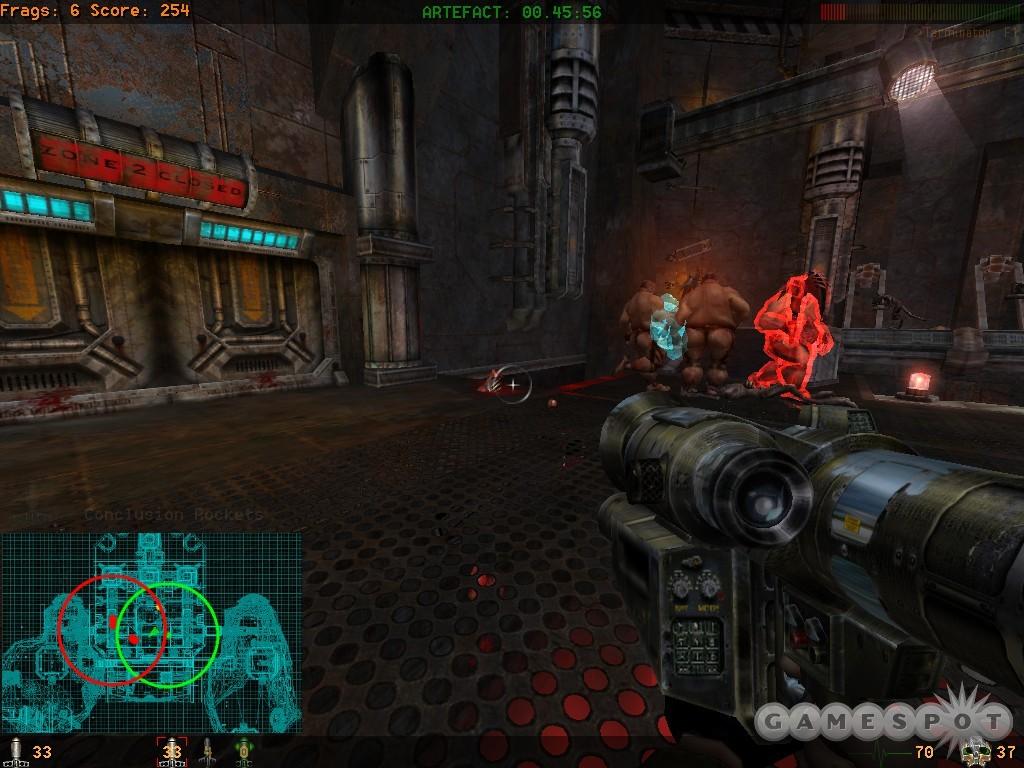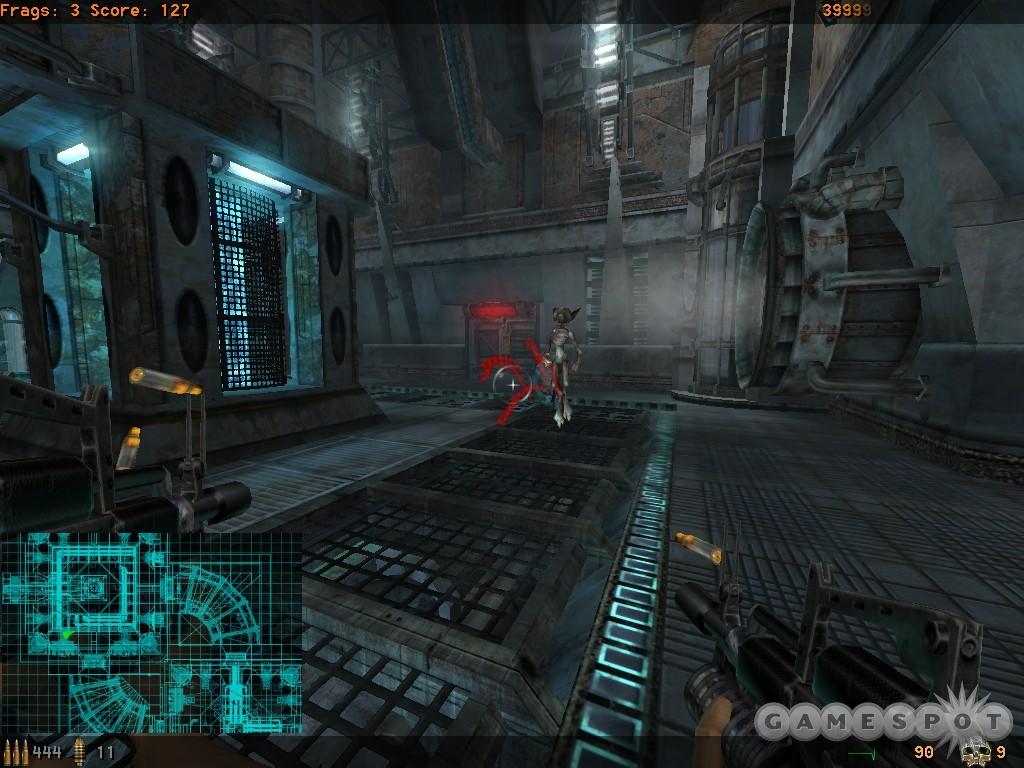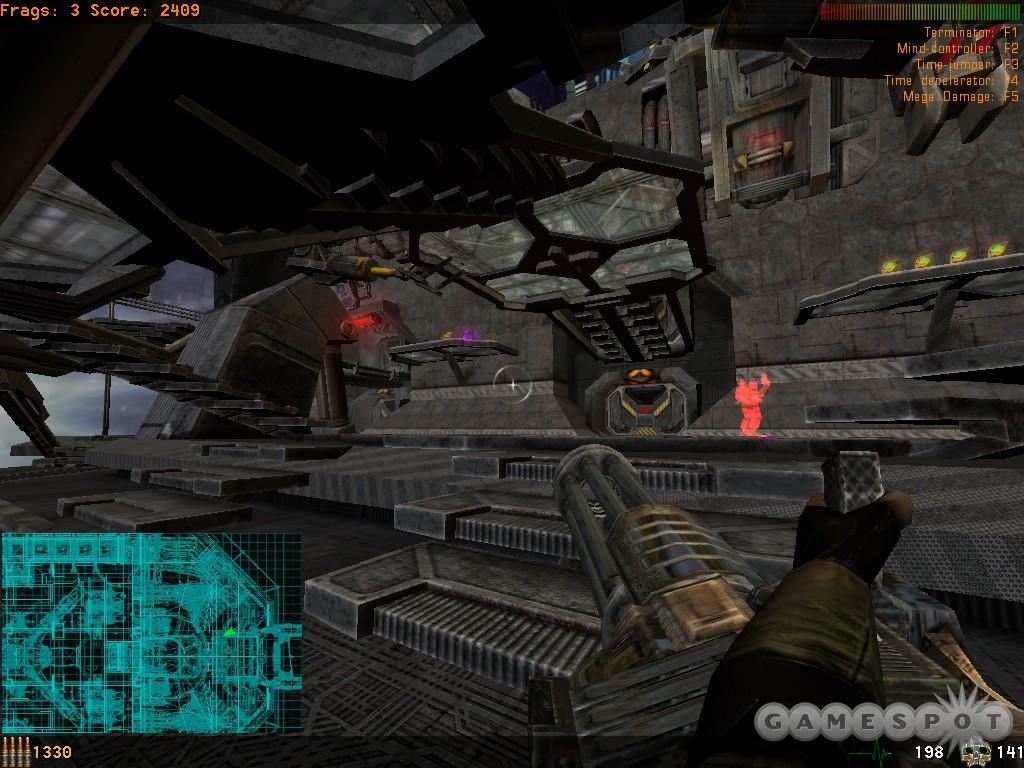FireStarter is pure nonsense. That's not necessarily a bad thing, though. This run-and-gun shooter follows in the fine tradition of the Quake and Unreal Tournament series. While certainly not as good as those games, FireStarter mimics them by featuring a throwaway story, bizarre settings and enemies, tons of weapons, and buckets of blood. Don't expect cutscenes, scripted events, memorable characters, stealth missions, or careful tactics. Do expect nonstop, over-the-top violence where killing is your only goal, and killing is its own reward. FireStarter is rough around the edges, it's thematically incoherent, and it's a victim of feature creep, but along with fast-paced action, it has some interesting twists that give it a little depth.

Created by Ukrainian developer GSC Game World (Cossacks, Codename: Outbreak), FireStarter at least theoretically includes a story. As in the days of old, when shooter stories often boiled down to a few lines in a readme file, here you only learn the story--such as it is--from the game box. In the year 2010, a virus infects a virtual reality machine, called FireStarter, by trapping the player's conscious inside. To escape, you have to fight wave after wave of virtual monsters. The game opens with a slick-looking but wordless and incomprehensible movie that presumably is supposed to draw you into this whole virtual reality conceit.
The story never even appears in the game and really only seems like an excuse to throw you into a hodgepodge of settings where you'll face off against totally unrelated enemies like robots, zombies, demons, lizardlike aliens, and other staples of traditional shooters. One second a spiked metallic sphere the size of a basketball will be roaring down a hall after you. Then some humanoid in a trench coat will pop out from behind a pillar to try to burn you to a cinder with a flamethrower. As soon as you finish him off, a lumbering alien creature might march through a doorway and open up with a machine gun. Sadly, this diversity is only skin-deep. Rarely do you have to alter your tactics for different enemies. Just stand back, blast away, and you'll do fine.
FireStarter adds a tad more interest to the mix by offering six different character classes (with unique initial ratings for health, armor, and speed) as well as favored weapons and certain limitations. As you progress through the game's levels, you earn experience points by killing monsters and grabbing their glowing souls before they vanish. These points boost your core ability ratings and let you adopt and then boost special skills. These skills allow you to do things like carry heavy weapons without a movement speed penalty, carry extra ammo, or fall from great heights with limited damage. The character classes and skills don't radically alter the gameplay, but they add some variety and replay value to what's otherwise a very repetitive--if not downright monotonous--game.
The basic gameplay is pretty straightforward, though the clumsy manual and help screens (replete with broken English and typos) might lead you to believe otherwise. Playing either from a first- or third-person viewpoint, you progress through 16 levels that are grouped into four architectural themes. Each map is divided into zones that open up as you destroy waves of monsters that coalesce from thin air. Once you've opened all the zones and have killed off all the monsters, you beat the level. Then you upgrade your character (if you've earned enough experience points to reach the next character level). And then you move on to the next game level for more combat.

Scattered across each level you'll find various weapons, ammo, health, and armor power-ups, which reappear after set time periods. That's standard stuff. What aren't standard are artifacts. Occasionally, a glowing object will appear, and you'll have a certain amount of time (depending on the difficulty setting) to nab it before it disappears. If you don't get to it in time--game over. If you do grab the artifact, it acts as a save point for quick loads, which is very handy since you can otherwise only save at the beginning of a level. Artifacts only appear in the most recently opened zone on the level, so you have to be careful about leaving that zone to get power-ups elsewhere because you may not be able to return in time.
To add to the potential confusion, "artifacts" also refer to special bonus powers that run on slowly recharging "psycho energy." As you acquire these over time, you gain neat abilities, like being able to teleport out of harm's way, turning invisible, or causing a monster to attack its allies.
If this all sounds like too many ingredients in the pot, it probably is. None of these ideas feel developed to their fullest potentials. FireStarter also goes overboard by giving you tons of different weapons--from a circular saw to an assault rifle to a plasma gun and more--many with both light and heavy variants, alternate fire capabilities, and varied ammo. None of these weapons have the exquisite balance or sheer "wow" factor that the best weapons of, say, Quake III Arena or the original Unreal Tournament have, but each has its strengths and weaknesses, thanks to different reload times, recoil, and so forth.

Combat itself is fairly well paced--except for when the action clumsily pauses for the camera to shift to the location of a newly materialized artifact--and offers an optional bullet-time feature that kicks in whenever you come under attack. The fighting ranges from walk-in-the-park easy to outrageously hard, thanks to a wide range of difficulty settings. The level designs are competent and feature decent flow patterns and power-up placement, but they're all anonymous and are quickly forgotten as soon as you finish them.
FireStarter offers an instant action mode that lets you play on any level you've unlocked in the campaign. There are also four multiplayer modes, including co-op, though they're only playable on a LAN (not online), which rules them out for many players.
Just like the gameplay, FireStarter's visuals are a hodgepodge of ideas, most of them seemingly lifted from Quake III and Unreal Tournament. You'll encounter some monumental architecture, intricate textures, and loads of impressive lighting and particle effects, but there's precious little rhyme or reason behind it all. None of the levels feel like real places, even within the context of fantasy. Instead, they seem like they were just opportunities for the artists to throw together a bunch of steam vents, conduits, flashing lights, and mirrored walls. For what it is, the art is pretty good (a couple of the later levels even beat Unreal Tournament at its own visual game as far as bristling high-tech space stations are concerned), but ultimately it's totally empty eye candy. Character models are also well detailed but are uninspired, and the same holds true for the game's weapons. Where graphics are concerned, FireStarter can feel more like a tech demo than a game. There's also an odd bit of cartooniness present so that when you shoot monsters, brilliant red blood gushes into the air in stylized torrents, as if it was sprayed from hoses. Presumably, you can chalk it up to the fact that the creatures are supposed to be virtual reality constructs.

The visuals are generic but offer lots of technical pizzazz. The audio, though, is pretty weak and includes competent but forgettable weapon effects, disposable techno music, and horribly under-characterized enemy noises. FireStarter suffers throughout from this lack of character and originality, and its design document probably could have used more careful editing. On the bright side, the game offers decent action with some interesting twists, thanks to the character-building elements. FireStarter is a decent shooter, but it lacks the imagination and polish that separate competent games from the ones you just can't put down.